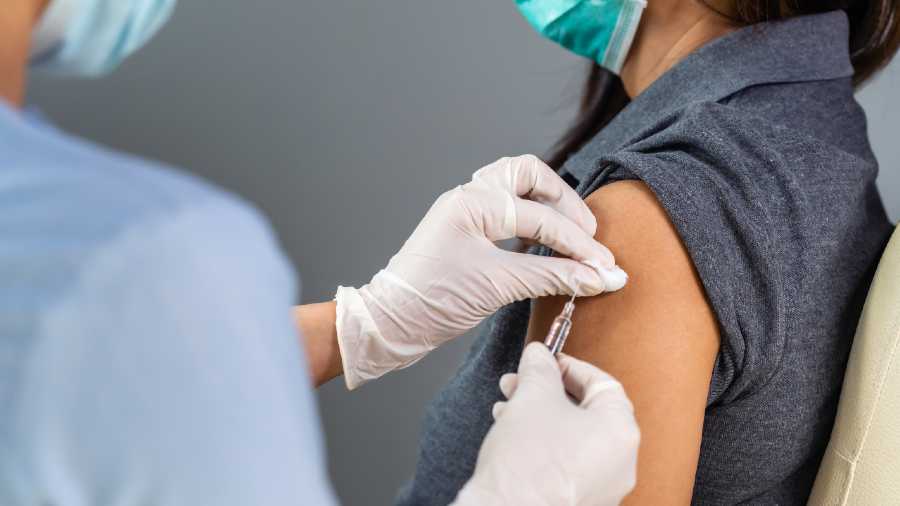As people across the world grapple with the prospect of living with the coronavirus for the foreseeable future, one question looms large: how soon before they need yet another shot?
Not for many months, and perhaps not for years, according to a flurry of new studies.
Three doses of a Covid vaccine — or even just two — are enough to protect most people from serious illness and death for a long time, the studies suggest.
“We’re starting to see diminishing returns on the number of additional doses,” said John Wherry, director of the Institute for Immunology at the University of Pennsylvania, US. Although people who are over 65 or at high risk of illness may benefit from a fourth vaccine dose, it may be unnecessary for most people, he added.
Federal health officials including Dr Anthony Fauci, the Biden administration’s top Covid adviser, have also said that they are unlikely to recommend a fourth dose before the fall.
The omicron variant can dodge antibodies — immune molecules that prevent the virus from infecting cells — produced after two doses of a Covid vaccine. But a third shot of the mRNA vaccines made by Pfizer-BioNTech or by Moderna prompts the body to make a much wider variety of antibodies, which would be difficult for any variant of the virus to evade, according to the most recent study.
The diverse repertoire of antibodies produced should be able to protect people from new variants, even those that differ significantly from the original version of the virus, the study suggests.
“If people are exposed to another variant like omicron, they now got some extra ammunition to fight it,” said Dr Julie McElrath, an infectious disease physician and immunologist at Fred Hutchinson Cancer Research Center in Seattle, US.
What’s more, other parts of the immune system can remember and destroy the virus over many months if not years, according to at least four studies published in top-tier journals over the past month.
Specialised immune cells called T cells produced after immunisation by four brands of Covid vaccine — Pfizer-BioNTech, Moderna, Johnson & Johnson and Novavax — are about 80 per cent as powerful against omicron as other variants, the research found. Given how different omicron’s mutations are from previous variants, it is very likely that T cells would mount a similarly robust attack on any future variant as well, researchers said.
This matches what scientists have found for the Sars coronavirus, which killed nearly 800 people in a 2003 epidemic in Asia. In people exposed to that virus, T cells have lasted more than 17 years. Evidence so far indicates that the immune cells for the new coronavirus — sometimes called memory cells — may also decline very slowly, experts said.
“Memory responses can last for ages,” said Wendy Burgers, an immunologist at the University of Cape Town, South Africa, who led one of the studies, published in the journal Nature. “Potentially, the T-cell response is extremely long lived.”
Throughout the pandemic, a disproportionate amount of research attention has gone to antibodies, the body’s first line of defence against a virus. That is partly because these molecules are relatively easy to study. They can be measured from a drop of blood.
Waning antibody levels after two vaccine doses prompted federal officials to recommend boosters for everyone older than 12. The extra shots fortified antibody levels and helped to contain omicron’s spread, but they too appear to lose some of their ability to prevent infections within four months, according to recent data from the Centers for Disease Control and Prevention.
Antibodies recognise two or three key parts of the spike protein, a protrusion on the outside of the coronavirus that allows it to latch on to human cells. But T cells detect many more parts of the spike, and so are less likely to fail when the virus gains mutations in some of them.
Vaccines also encode a memory of the virus in B cells, which can churn out fresh batches of antibodies within four or five days after a new exposure to the virus.
This dual punch of T and B cells help explain why many people who received two or even three doses of vaccine could still be infected with the omicron variant, although only a small percentage became seriously ill.
“You will see a decrease of the antibody levels over time, but if memory B cells are still there, and memory T cells are still there, they can kick back into action relatively quickly,” said Alessandro Sette, an immunologist at the La Jolla Institute for Immunology in the US, who led a new study of T cells published in Cell.
Researchers showed last year that the elite school inside of lymph nodes where the B cells train, called the germinal centre, remains active for at least 15 weeks after the second dose of a Covid vaccine. In an updated study published in Nature, the same team showed that six months after vaccination, memory B cells continue to mature, and the antibodies they produce keep gaining the ability to recognise new variants.
In the newest study, another team showed that a third shot creates an even richer pool of B cells than the second shot did, and the antibodies they produce recognise a broader range of variants.
NYTNS










